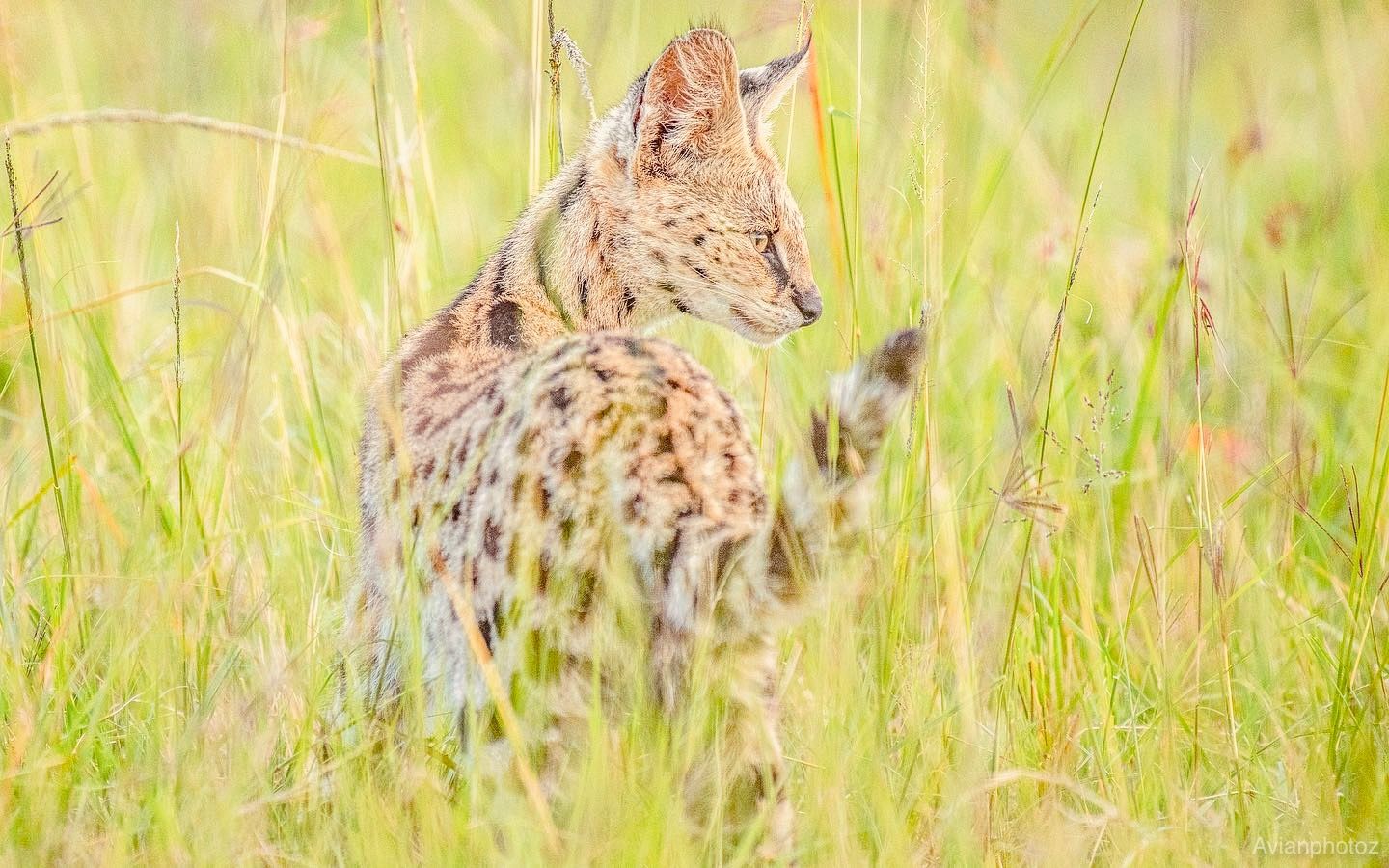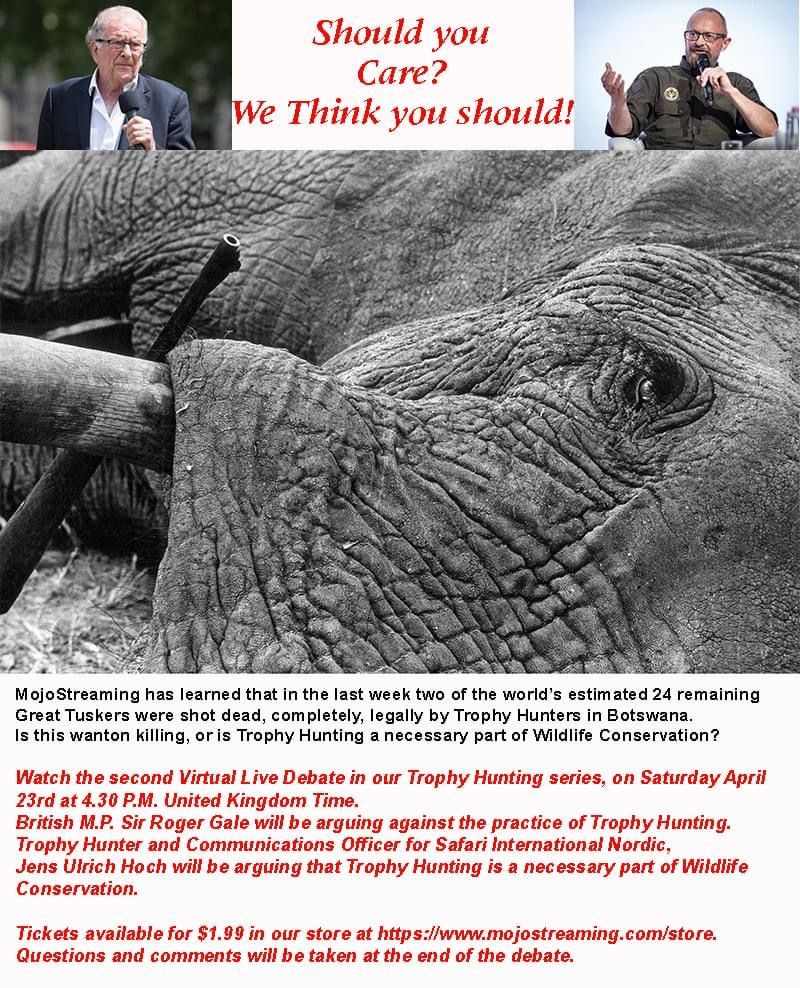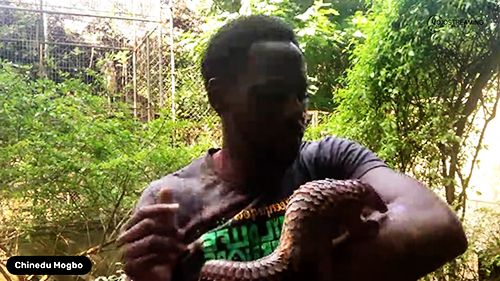 The elusive Serval Cat! These wonderful small cats are often found out in the open grasslands. They are very successful hunters and mostly eat rodents, birds, reptiles, frogs and insects. They very rarely will scavenge for their food due to their efficient hunting!
The elusive Serval Cat! These wonderful small cats are often found out in the open grasslands. They are very successful hunters and mostly eat rodents, birds, reptiles, frogs and insects. They very rarely will scavenge for their food due to their efficient hunting!
It often makes my day when we come across a Serval, we mostly find them when they are hunting which is a wonderful behavior to observe. They will locate their prey, ready themselves, then with a sudden jump/pounce they fly through the air and land on the unsuspecting prey!
seeing and encountering them is easy just one click away www.interiorsafarisea.com
RE: URGENT Matter to Rescue 80 Bureau of Land Management branded horses & burros from immediate endangerment
November 10, 2022
Dear President Biden and Secretary Haaland,
Today there are 80 federally protected horses and burros under the present threat of sale and export for slaughter in 8 States and are in urgent need of rescue.
We need your immediate help to instruct the Bureau of Land Management today to rescue 80 BLM-branded mustangs and burros from Livestock-kill buyer auctions and to save them now from the life-threatening danger of harm and the most brutal death in 1. Bowie, Texas, 2. Stroud, Oklahoma, 3. Shippensburg, Pennsylvania, 4. Peabody, Kansas, 5. Cleveland, Tennessee, 6. Asheboro, North Carolina, and 7. Cleburne, Texas, 8. Rusk, Texas, 9. Rollin hill Farm, Virginia, and 10. Southern Wisconsin. (Please see links below)
An emerging crisis is happening for the government-captured wild horse and burros and the 80% of Americans who oppose the grisly slaughter of these magnificent beings due to a massive influx of BLM-branded equines showing up in large numbers across the country in livestock slaughter auctions.
To resolve this tragic disaster, we need your help to issue an executive order, a "stay on the export of horses and burros for slaughter," to be executed to spare these magnificent and federally protected icons of freedom from unimaginable suffering.
The Extortion of BLM-branded horses and burros:
The livestock auctions force sanctuaries and citizens to bid against kill buyers for the BLM- branded horses. This extortion is creating an enormous burden to pay exorbitant prices to save these horses from horrific suffering that is unjustly and enormously falling upon citizens, sanctuaries, and rescues due to the BLM's expedited mass removals of wild horses and burros from public lands and the BLM's enticing $1,000. the adoption incentive program, many of the sanctuaries are presently full.
It is incredibly unethical to place the formerly free wild horses after capture in inhumane and life-threatening conditions and then charge back to citizens, to have no choice but to pay exorbitant fees to kill buyers, to save them from export for tortuous slaughter.
Solutions, in summary, we implore you to:
We are ready to work with you to help shift the paradigm to implement compassionate solutions that will benefit the survival of our lands, wild ones, indigenous and surrounding communities, and all stakeholders today and for future generations.
"Climate change is real; we need to make changes as soon as we can, or else, we are self- destructing. The help we receive from wild horses will help us work on positive solutions for wild lands and the climate change crisis that Mother Earth and we all are facing. Horses are sacred to me, my people, and many people, and I ask that you do all within your power to protect them today." ~ Chief Lee Plenty Wolf, Director on LWH Board
The Free Roaming Wild horse and Burro Act of 1971 clearly state that the BLM shall not endanger or cause suffering or harm to the horses. The BLM's incentive program, and lack of a safety net to protect the horses after adoption from export to Mexico and other countries for sale to the most inhumane, brutal slaughter, are causing immense suffering and harm for thousands of horses.
The positive intent of this Law enacted is clear; a great deal of entrustment is granted to the BLM and its affiliates to honor its true purpose, and we are seeing many misinterpretations and wrongful manipulation of this Law harming the horses and burros and the land.
We need your help now to close these loopholes to truly protect the last of our wild horses and burros and our grassland ecosystems to survive and thrive today and for future generations to inherit.
Thank you in advance for your immediate address of this urgent situation, from all of us, and all the wild horses and burros,
Love Wild Horses!® a California grassroots Nonprofit 501C3 lovewildhorses.org Office- 833- 2ReWild heartofsky@lovewildhorses.org
LWH Directors on the Board:
Jetara Séhart, Founder and President
Chief Lee Plenty Wolf, Spiritual Leader and award-winning Prayer Drummer and Singer of the Oglala Lakota Nation, Founder, and President of White Horse Creek Council 501C3
Evelyn Arce, Founder, Indigenous Resilience Consulting LLC
Michael Stocker, Founder and Executive Director Ocean Conservation Research
Core Members:
Jackie Oliveri, Co-Founder, Nationwide Wild Horse Freedom Rallies, Core Member of Advocates for Wild Equines AWE, and National Coordinator for Love Wild Horses®
LWH Voices for the Wild Hones and Wild lands:
Dewey and Penny Bunnell, Rock Star and his beautiful wife, Founding Member of the band America
Links to the Livestock Auctions, where wild horses are suffering, and in immediate danger of export for slaughter and in need of rescue today:
# of Horses and Burros in URGENT Danger:
1. 11 Bowie, in TX: https://www.facebook.com/BowieTexasHorses
2. 34 Stroud's OK: https://fb.watch/gHz4k8guP3/?fbclid=IwAR1f0U7pqiOv486eeqyPHRMYjjin1STpYfBEfStydtIfXT0 gjc_g4WnlHN8
3. 2 in Rotz in PA: https://m.facebook.com/people/Rotz-Livestock/100082195336491/?paipv=0&eav=AfbM_JrrmoVvM1vnkyBFpylo7dm_ZVqC2W2oGie YwT LbJjJ6uaCOSCNVxAaGDlJWKx
4. 3 Peabody's in KS: https://m.facebook.com/Peabody-Kansas-Horse-Pen- 101725224522129/?paipv=0&eav=AfbTi1vW_bsTrJAwvBWj1iF5DPiJyqIwqEcI8agNTrR5jd13um1 z0 qO98AUw5pD0mOs
5. 1 Saving Slaughter bound horses, in
TN https://m.facebook.com/tspsavingslaughterboundhorses/?paipv=0&eav=AfYjQoA0gzJfzLQEUG G2-4WMZ7SHT7_oVEEWldxUAGaRjscKvy9TyTpTNmf4FLl2DTM
6. 1 Last Chance-in
NC: https://m.facebook.com/lastchancekillpenhorses/?paipv=0&eav=Afbzf3PPM1DamqmzqrCVd_IrhEGW4emESUkAwmLoFxy2cDeFQsj0y02nDrNqTzz8aP0
7. 15 -Load of Mustangs-Cleburne, in TX
: https://m.facebook.com/cleburnehorseauction?eav=AfaHuGHAunUeSeAkmozH5yI0AmNfR83tt 9oC poojMpQWEnLFh229TdsFG6HZ140_43g&paipv=0
8. 1 Rusk, Texas:
9. 1 Rollin Hill Farm in VA.: https://www.facebook.com/profile.php?id=100063638406549
10. 1 Southern Wisconsin: https://www.facebook.com/groups/148134633436039/?ref=share
Additional Links for Reference: https://ladyfreethinker.org/three-wild-horses-saved-by-indigenous-advocates-working-to- prove- letting-them-roam-helps-the-land/ https://apnews.com/press-release/ein-presswire-newsmatics/science-california-united-states-horses- congress-bcc27c0fb3b9410c3b2eb1101b4b5b86 https://environment.einnews.com/pr_news/569756372/a-wild-horse-and-earth-healing-study- begins- in-nevadahttps://acrobat.adobe.com/id/urn:aaid:sc:VA6C2:dc647a2c-472b-4ff2-8115-a70e3202d2d8https://www.internationalenvironmenttimes.com/article/554604672-a-rock-star-lakota-chief- and- indigenous-filmmakers-unite-in-let-them-live-love-wild-horses-a-raw-short-film https://globalwarming.einnews.com/pr_news/548241235/wild-horses-a-natural-resource-for- staving- off-wildfires-and-the-impacts-of-global-warm
Contact President Biden:
CALL: 202-456-1111 FAX 202-456-2461
To Contact Secretary Deb Haaland
Call: 202-208-3100 FAX: 202-208-5515
SIGN ON TO OUR LETTER HERE
https://lovewildhorses.salsalabs.org/StopSlaughterofWildEquines

Facts on the Inhumane Practices of Hunting Contests
Hunting has been a popular activity for centuries, with many people enjoying the rush of tracking and taking down wild game. However, what many fail to realize is that this so-called "sport" has a darker side - one that involves animal cruelty, unethical practices, and inhumane treatment of wildlife. Hunting contests are just one example of this, where hunters compete to see who can kill the most animals in a set amount of time. We'll take a closer look at these competitions and delve into the facts surrounding their impact on both individual animals and entire ecosystems. Hunting contests are typically held in environments where there is a high concentration of wildlife. This means that the animals involved in these contests have had their natural habitat reduced. In this blog post, we're going to expose the dark side of hunting competitions in America - from baiting and trapping animals to using illegal methods - so buckle up and prepare to be shocked.
Many people don't realize is that the so-called "sport" has a dark side – one that involves animal cruelty
Many people view hunting as a traditional pastime that has been around for centuries. However, what many fail to realize is that the activities associated with this so-called "sport" can be incredibly cruel and inhumane. Hunting contests are one of the most egregious examples of this.
During these competitions, hunters compete to see who can kill the most animals within a set period of time. The focus is not on sustainable or responsible hunting practices but rather on winning at all costs. This often leads to unethical behavior such as cheating and taking shortcuts.
Moreover, hunting contests result in an astonishing number of animal deaths - far more than necessary for food or population control purposes. As a result, entire species have been pushed closer to extinction due to overhunting.
The suffering caused by these events cannot be overstated either. Many animals experience prolonged periods of pain before finally succumbing to their injuries - hardly a fair fight for any living creature.
It's important that we recognize the dark side of hunting and take action against practices like hunting contests that cause immense harm to wildlife populations and ecosystems alike.
Which States have the most hunting contests
Hunting contests are a widespread practice in many states across the US. According to reports, hunting competitions take place in more than 40 states, with some of them hosting multiple events each year. Among these states, Texas tops the list as having the most significant number of hunting contests.
In recent years, other states have also seen an increase in the number of hunting contests held within their borders. Arizona and New Mexico have become popular destinations for predator killing competitions, while Montana and Wyoming host several elk-calling tournaments.
However, it is worth noting that not all states permit hunting contests. California became the first state to ban wildlife-killing contests in 2014 when it outlawed coyote-killing competitions.
Despite this progress towards ending unethical hunting practices, there are still numerous challenges involved in bringing an end to such events altogether. It's essential that we continue raising awareness about this issue and advocating for stricter regulations surrounding wildlife management practices across all American states.
Texas does alot of disturbing unethical things involving wildlife and are very good as misleading the public
https://wildlifepartners.com/about-us/
"The above is a scam in my personal opinion. I had an interesting conversation with Brian Gilroy. I believe the organization has creatively fooled people that what they do is for conservation when I believe it is 100% about money. I also believe alot of their revenue comes from enclosed hunting on their ranch." Cami Ciotta
What organizations are behind hunting contests
Hunting contests are often organized by local hunting clubs, but there are also national organizations that support and promote these inhumane events. One such organization is Safari Club International (SCI), which hosts an annual convention where hunting enthusiasts can bid on hunts for rare and endangered animals.
One of the most hated by Activists is Jens Ulrich Hoch Hunter and Communications officer for Nordic Safari Club.
The National Rifle Association (NRA) is another powerful organization that supports hunting contests. They argue that these competitions promote responsible gun ownership and wildlife conservation, but the reality is far from it - many of the species targeted in these contests are not even considered game animals. The winners not only can win money, trophy hunting Safari trips, but also guns!
Other smaller organizations also exist to promote hunting contests, often with misleading names like "Wildlife Conservation Society." These groups claim to be working towards conservation efforts while simultaneously supporting activities that harm wildlife populations.
It's clear that the organizations behind hunting contests prioritize profit over ethics or environmental protection. It's up to individuals to educate themselves on the true motives of these groups and take action against their harmful practices.
Why are there not stricter rules and regulations for hunting contests
Despite the evident inhumane practices of hunting contests, it remains legal throughout many states in the US. However, one may wonder why there aren't stricter rules and regulations for this so-called "sport." The answer to that is not simple.
Firstly, hunting has always been a part of American culture. It has existed for centuries as a means of gathering food or protecting livestock from predators. Due to its cultural significance, it can be challenging to convince lawmakers and hunters themselves to change their ways.
Secondly, hunting contests are often organized by powerful organizations such as the Safari Club International (SCI) or the National Rifle Association (NRA). These groups have significant lobbying power and influence over politicians who make laws that govern hunting activities. Plus many of our lawmakers are bought by the NRA and they now own them. The most powerful organization and most harmful organization in the U.S. is the NRA. Until someone, or some group has enough resources/money the NRA will always win and will continue to run the U.S. The way to win and to take their power away is to get enough citizens to go against them. It is all in the numbers.
Despite efforts made by animal welfare activists and environmentalists to push stricter regulations on these events, they still face opposition from those who view them as an infringement on their rights. Additionally, law enforcement agencies tasked with enforcing existing regulations may lack resources or funding necessary for proper implementation.
As a result of these factors combined with other underlying issues like politics and economics; our wildlife continues suffering at the hands of unethical slaughter during hunting competitions.
Why are hunting contests legal
The legality of hunting contests is a perplexing issue, especially given the inhumane and unethical practices associated with such events. It's important to understand that hunting is regulated by state laws, meaning jurisdictions play a significant role in determining whether or not hunting competitions are legal.
One reason why these contests may be considered lawful is because they generate revenue for both private businesses and state governments. Hunting activities bring money into rural areas through tourism, lodging, food services, and equipment sales. Additionally, states often receive license fees from hunters which help finance conservation efforts.
Another argument used to support the legality of these contests centers around individual rights. Proponents argue that participating in hunting contests falls under their right to bear arms and pursue leisure activities as guaranteed by the Constitution.
Unfortunately, it seems that concerns about animal welfare have been overshadowed by financial gain and personal freedoms when it comes to regulating hunting competitions. The fact remains that these events cause immense suffering for wildlife populations and can disrupt entire ecosystems - all in the name of "sport".
How Legislation is Failing to Protect Animals from Hunting Contests
Despite efforts by animal rights activists and the public, legislation is failing to protect animals from hunting contests. Hunting competitions are legal in many states, which means that organizers can hold them without fear of criminal prosecution.
In most cases, there are no laws regulating these events. Even when regulations exist, they may be weak or poorly enforced. This lack of oversight allows hunters to engage in unethical behavior such as using illegal baiting techniques or shooting more animals than allowed.
Furthermore, some organizations behind hunting contests have powerful lobbyists who influence state legislators and prevent stricter regulations from being implemented. These lobbyists argue that hunting contributes to conservation efforts and brings economic benefits to rural areas which is a huge lie and people are believing such lies. Please step up and do your part by educating others or simply share this article.
However, the reality is that hunting contests often lead to the unnecessary slaughter of wildlife and cause suffering for individual animals. Species can also become endangered due to excessive hunting pressure on their populations. The ecosystem itself can suffer if certain species disappear or become too scarce.
It's clear that current legislation is not doing enough to protect animals from inhumane practices associated with hunting contests. More needs to be done at both the state and federal levels if we want a future where wild animals are treated with respect and dignity rather than as mere targets for cruelty and sport.
What You Can Do To Help End hunting competitions
It's time to take a stand against the inhumane practices of hunting contests and protect our wildlife from suffering, torture, and extinction. As individuals, we can make a difference by raising awareness about these unethical competitions and advocating for stricter regulations.
One of the most effective ways to end hunting contests is to support organizations that are actively working towards this goal. Consider donating your time or money to groups like the Humane Society of the United States or Project Coyote is a favorite of MojoStreaming. https://projectcoyote.org/
Also, support MojoStreaming an online wildlife channel that are advocates for our wildlife. Join us for free (for a limited time) to watch or even participate in live debates, interviews, and more. Join other like-minded, compassionate people who have a love for nature and wildlife! It is a great community to be a part of: Learn more at
https://www.mojostreaming.com/
Sign up: https://www.mojostreaming.com/signup
Additionally, you can reach out to your local representatives and urge them to enact laws that ban hunting contests altogether. Your voice can make all the difference in protecting our ecosystem from needless cruelty and slaughter.
I URGE EACH OF YOUR READING THIS TO WATCH THIS 2 MIN TRAILER!
Share this video: https://www.mojostreaming.com/video/837/wildlife-killing-contest
If you have time watch this informative but disturbing short film:
https://www.youtube.com/watch?v=mV0UZsaMjMM
Let us remember that animals are sentient beings deserving of respect, compassion, and protection. By taking action today, we can create a better future where wildlife is cherished rather than exploited for human entertainment.


